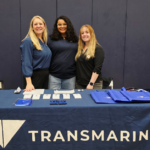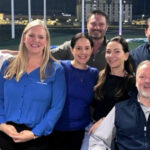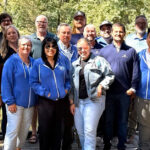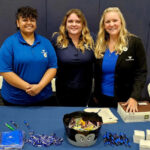This year at Transmarine Navigation Corporation, we celebrated our 85th anniversary. In that span of time, we’ve learned the importance of ever looking forward: preparing for the unpreparable, innovating without a moment’s notice, and continually supporting both our team members and our clients through changing tides.
Because we’re also in a world (and an industry) with more frequent turnover between companies and even careers, loss of institutional knowledge remains an ever-present threat. We no longer see people in each of our locations dedicating their entire career to the company, staying for decades and providing wise counsel to newcomers. But fewer total years of industry experience among these valued new teammates means that shared knowledge is sorely needed. Which is why education at Transmarine — something we’ve enthusiastically shared since our beginnings — has become even more important.
Here are a few ways we’re training up the future trusted leaders at Transmarine.
Utilizing Membership Benefits
Our long-standing membership with the Association of Ship Brokers and Agents (ASBA) provides many benefits, including access to training and education for our key staff members. We’re always on the lookout for those who are interested in ASBA courses that aid in their understanding of the nuances of what we do, such as The Business of Shipping and Basic Principles of Chartering.
“These courses are an investment,” says Director of Administration and Compliance Phil Brotherton, “but they come through every region each quarter, so we look to see if we can get two or three team members from that area who show interest. We like to see who puts their hand up, because it indicates to us that they want to grow personally.”
Utilizing the education from ASBA allows us to both invest in our people and support the organization and their efforts to advocate on behalf of agents and ship brokers in North America.
James Papp, Head of Strategic Ventures (and a Transmarine veteran since 1983), also knows the curriculum from ASBA provides excellent information. “Their book, Ship Agency: A Guide to Tramp Ship Agency and Practice covers the nuts and bolts of ship agencies. It makes great additional reading for anyone who needs to understand the intricacies.” During his tenure with us, Papp has distributed 60 or more copies to new managers and hires to supplement their training. “Since there are no schools here in the U.S. for this very old profession,” he acknowledges, “we have to create it on our own.”
Educating (and Elevating) from Within
Engagement with ASBA is also a part of our internally designed training programs. The finale of our 90-day Operations onboarding, for example, includes the ASBA certification process. Their handbook on the business of shipping is also given to everyone who participates. And our Accounting & Documentation departments also have their own rigorous onboarding process.
But education at Transmarine doesn’t end with onboarding. Mentoring newer internal team members as they grow with Transmarine is also an ongoing priority.
Brotherton and Papp have both served to identify and onboard new team members over the years, providing enthusiastic guidance when needed as needed as these leaders have moved up in their positions. “Helping to promote people internally is my favorite part,” says Brotherton. “When you help people who are helping themselves, it creates bandwidth in relationships that goes far beyond the minimum of what we need, and fosters a really good working style.”
Ian Mantha (who is now our Director of Operations), is one such example. “[Mantha]’d had all this great training from the Starbucks Management Training program,” describes Brotherton, “had managed vendors and staff. We saw the whole package at once. He came on as Vessel Manager, then became Operations Manager, then moved into District Manager, and on up into his new position as Director of Operations.”
In this new role, Mantha is helping us not only improve our internal education, but also Transmarine’s future. “District Managers and Operations Managers get into a lot of technical details with the ship,” Brotherton explains, “so you still need the background on all those details. But now we’re also asking: how do you help someone grow and do better and, most importantly, retain them? This is a silver bullet for customer service. You have to build these abilities.”
Mantha is not only ready for the job, but excited to take it on. “My passion is people and teams,” he asserts. “I want to set our managers up for success. A lot of times when you’re moving up in a company,” he explains, “it requires new skills — maybe out of the general purview of what your old job was. For example, do you know how to give a review beyond peer-to-peer feedback? A vessel manager is concerned, rightfully, with their ships. But becoming an Operations Manager meant I also had to start looking at what mattered to me back when I was in Operations myself. So my role became more about advocating for my guys upward to middle and executive management. As I moved into District Manager, I had to then bring my Operations Manager in line with what the executive team needed.”
Developing the soft skills and competencies capable leaders need will be one of Mantha’s priorities. He’s currently working on green lighting a program that can develop and identify those skills within people already working at Transmarine, and then mentoring them upward. “If we have someone in Seattle who has an interest in moving up and broadening their skills,” he illustrates, “we’ll connect them with someone in a different office who can provide that feedback and knowledge to them. As a company with multiple offices, we have an opportunity to visit different sites, which continues that legacy to jump in and help, and creates stickiness in the whole organization.”
“We don’t want to just use people as runners,” Brotherton elaborates. “Instead, if we give them ownership, they’ll have more awareness of what’s going on. They feel accomplished; they have a lot more job satisfaction.”
Executing all this is sometimes easier said than done, but we are up for the task. “The hardest thing for management training is people training,” Brotherton concludes. “Our plan is to help fill in the gaps when people don’t have the experience. It takes time to get exposed to different situations and build an intuition on how to handle things. But everyone sees value in building a stronger team for the long haul.”
Interns & Marine Students
Another way we educate for the industry’s future success is by working with interns and new graduates. “Over the last 15 years we’ve had five or six different interns,” explains Papp, “including maritime attorney students from France who worked in our offices as Operations assistants. They learned not just the nuts and bolts of the job, but the relationships between the players. We gave them a picture of how all these work together and how to manage the relationship with everyone.”
“We have so much training by doing,” Brotherton adds, “because there’s so many different scenarios for tramp ships. You can’t just say ‘read this book and you’ll know how it works.’
In our case, there are idiosyncrasies every time. It’s familiar and yet different, similar to construction: you build houses in a basic way, but each design may be unique to the house. You have to be agile for that.”
Some of that agility and readiness comes from candidates we hire from Maritime Academies or schools that have programs on the business of shipping. “We are actively hiring 10-15% of new people from places like SUNY, California Maritime Academy, and Texas A&M,” says Papp. “That is a growth area for us, because we get smart people at the start of their careers who seem to have unlimited ceiling and are already interested in the subject.”
Empowering new talent early on means not only are we able to help students find jobs and thereby support their schools, but we’re able to harness fresh, enthusiastic perspectives right away. And by investing further expert training in them, we’re keeping them around to tend to you and your shipping needs for a very long time. For more on how our talent pool can best serve yours today, email us at [email protected] or call +1-562-432-6941.








